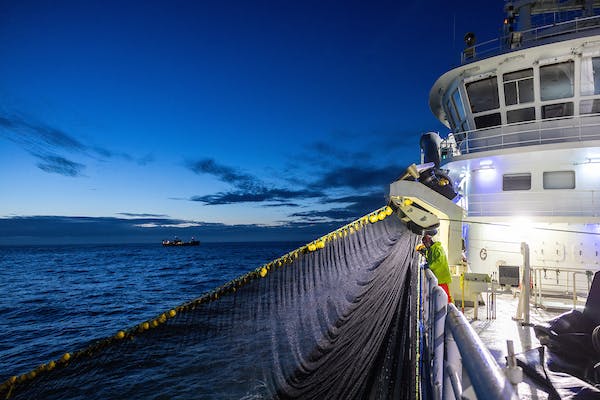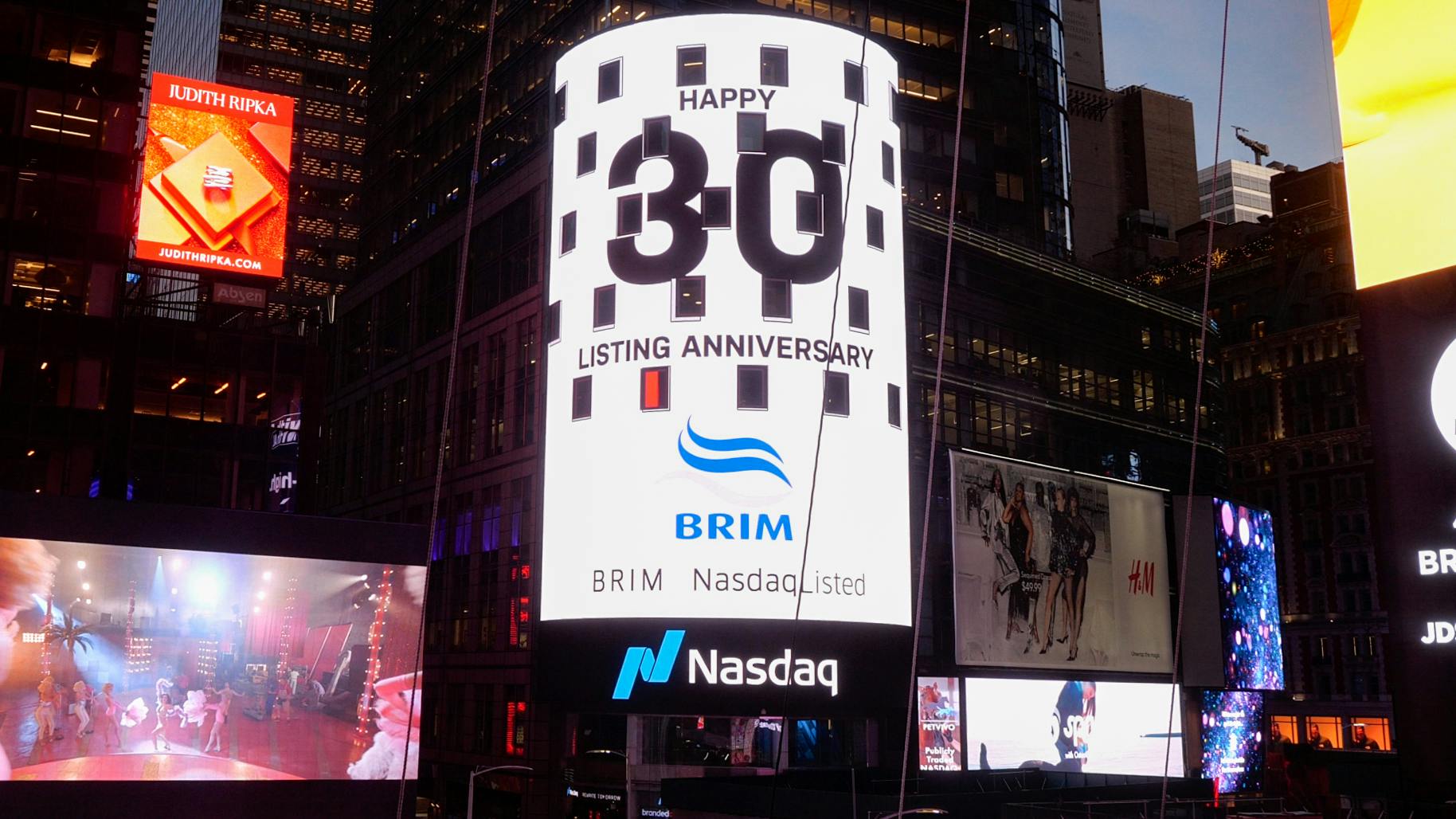Brim hf.
Annual and Sustainability Report 2022

Sustainable operations is Brim’s policy, which means that the company must achieve its economic goals for profitability, consider the environment and nature so that what is taken from it re-grows and ensure that society is strengthened and improved as a result of the company’s activities. The year 2022 brought us forward on this journey.

CEO’s Address
A fruitful year but uncertainty ahead
2022 was a fruitful year for Brim. Capelin fishing was successful, and catch was good. Whitefish fishing went as planned, although fishing quotas were 8 thousand tonnes less than last year. The processing of products yielded more valuable products, and foreign markets were favourable, prices were good and sales went well. Investments in new vessels, fishing quotas, high-tech processing equipment and marketing and sales in the last few years were beneficial for the operations. During the year, the freezer trawler Sólborg RE was purchased along with fishing quotas, and then an agreement was concluded for the purchase of a 50% share in the Danish company Polar Seafood Denmark A/S, which is a sales company and processor of seafood products.
Brim’s operating income in 2022 amounted to EUR 450.9 million, compared to EUR 387.9 million the previous year. Operating profit before depreciation (EBITDA) was EUR 117.7m, or 26.1% of the operating income, as compared to EUR 93.2m, or 24.0%, the previous year. Profit for the year was EUR 79.3 million, compared to EUR 75.2 million the previous year. Wages and wage-related expenses amounted to a total of ISK 13.3bn at the average exchange rate of the year, as compared to ISK 11.8bn the year before. The company’s tax footprint, which is the fees the company pays and collected taxes from employees, amounted to ISK 10.5 billon during the year, compared to ISK 9.1 billion the previous year. At year-end, the company’s income had never been higher annually, and the result was optimal.
The operation of a company is the work of people, so the success is primarily due to our people. Brim’s employees, in fishing, processing and in marketing and sales here at home and abroad, showed once again what they are made of. The company’s strategy and direction must also be clear so that everyone is sailing in the same direction. Since 2018, Brim has aimed for simple and sustainable operations, targeted use of fishing quotas, growth and increased profitability and dynamic work in the field of marketing and sales. This strategy has certainly been successful, since during this period, the value of products has increased, income has doubled and profit and profitability have almost tripled and are now higher than ever before in the company’s history.
Not just fish and funds
But Brim is not just all about fish and funds. Brim’s sustainable operation considers not only financial aspects, but also the environment and society. For the sixth year in a row, Brim publishes an environmental and social report where the company’s contribution to general progress and improvement in accordance with the United Nations’ Global Sustainable Development Goals can be identified. The report is based on powerful software that Brim has taken the lead in developing, and it highlights both the numerous and complex projects and that there is still a long way to go. It also shows that the company is on the right track and that it is possible to identify which actions have an impact and are effective. The company made progress toward its goals for energy consumption, recycling and other aspects that affect the company’s carbon footprint. During the year, the company set a policy on environmental and climate issues and is the first fisheries company in Iceland to do so. In it, we aim to reduce emissions and carbon neutrality in the long term, and especially to reduce emissions in proportion to the income generated by the operations. During the year, the company purchased the land Torfastaðir in Vopnafjörður and aims to become an active participant in carbon offsets through forestry, restoration of wetlands or other approved methods. On this subject, it is important to bear in mind that important factors such as the development of generators powered by green energy or the availability of electricity for establishments in remote and sparsely populated settlements are dependent on external conditions. Brim therefore dedicates itself to working systematically towards the goals that are in the hands of the company and to always be ready to implement cost-effective environmental solutions when they become available. But sometimes this can be difficult to achieve, like now when Landsvirkjun has decided to sell Guarantees of Origin for electricity, which means that Brim must pay the company for the ability to demonstrate to its customers that electricity in Iceland is green. This means increased electricity costs and is a perverse incentive to invest in electricity resources during processing, thus working against the government’s goals of energy transition and carbon neutrality. Brim will not be buying Guarantees of Origin from Landsvirkjun in 2023.
Brim is an active participant in the community and contributes to various activities with the aim of promoting sports, culture, education and other social infrastructure. It is the company’s position that a strong and diverse community lays the foundation for a healthy society and thus a robust economic sector in international competition. The company’s collaboration with the Icelandic Literature Society and the company’s efforts in the interest of the Icelandic language are highlighted, but in addition, the company supports search and rescue teams and sports clubs in the company’s areas of operation and various marine-related projects such as the Fisheries School for Young People. Brim also has a successful collaboration with Akranes municipality regarding the future of Breiðin, which is at the shores of the Skipaskagi Peninsula where the company’s premises were located in the last century, and last year, a successful ideas competition was held for the development of the area, which received a very positive response from the locals and raises hopes of an untapped opportunity in the municipality.
Sustainable operations is Brim’s policy, which means that the company must achieve its economic goals for profitability, consider the environment and nature so that what is taken from it re-grows and ensure that society is strengthened and improved as a result of the company’s activities. The year 2022 brought us forward on this journey.
The prospect of increased risk
The situation today is uncertain. There is war and inflation in Europe, and in Iceland, there is unrest in the labour market on top of the highest inflation in fourteen years. All of these factors can have a major impact on Brim’s operations and create risks in the company’s operations.
There is also a growing lack of trust in the public infrastructure of the fishing industry, especially when it comes to research and the criteria of consultation to the government on the allowable catch of species. In some whitefish species such as redfish and cod, fishing quotas have been significantly reduced in recent years, even though fishing consultation for decades was aimed at protecting and strengthening those stocks. In Brim’s operations, this manifests itself in such a way that even though the company has increased its catch share in whitefish, it catches ever smaller quantities.
In addition, it is worth mentioning the persistent political uncertainty regarding the rules of the game in the sector. On the political level, calls for changes to the fisheries management system are often heard now that the economic goals of value creation and profitability have finally been achieved after three decades of development. But this is done in the name of harmony, which in the end has never existed and cannot be achieved. It is important that there is stability and predictability, as the parties in the sector have committed themselves and adapted investments and operations to the fisheries management system that has established itself in recent decades. On the other hand, there will probably be endless disputes about the distribution of the dividends that the sector produces.
In light of these current circumstances, we at Brim believe it is right to proceed with caution in all important decisions concerning the company’s future in the coming months. Going forward, the future will bring new opportunities, and like in the past years, Brim will seize them and develop them sensibly. The company’s goals are clear, and we will continue to work towards them for the benefit of employees, customers, the environment, shareholders and society as a whole.

About the Annual and Sustainability Report
For the sixth year in a row, Brim reports on the non-financial aspects of its operations and for the third time with a joint Annual and Sustainability Report.
All information in the report is in accordance with the best knowledge we have at the time of writing, but it is not an exhaustive assessment of all the impact that Brim has on the environment, society and/or the economy. The report is not audited by a third party, but EFLA has reviewed the presentation and information on environmental aspects.
Information on the non-financial aspects of the operation is prepared in accordance with the GTI Standard (Global Reporting Initiative GRI100-400) and Nasdaq’s UFS guidelines.
Increased requirements for disclosure due to non-financial factors are foreseeable, related to the implementation of CSRD (Corporate Sustainability Reporting Directive) and SFDR (Sustainable Finance Disclosure Regulation). Work on the annual and sustainability report has aimed to prepare Brim's increased disclosure in this area.